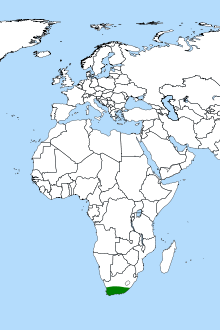Roridula
From Wikipedia, the free encyclopedia
| Roridula | |
|---|---|
 | |
| Roridula gorgonias | |
| Scientific classification | |
| Kingdom: | Plantae |
| (unranked): | Angiosperms |
| (unranked): | Eudicots |
| (unranked): | Asterids |
| Order: | Ericales |
| Family: | Roridulaceae Engl. & Gilg (1924) nom.cons. |
| Genus: | Roridula L. (1764) |
| Species | |
 | |
| Roridula distribution | |
Roridula (/rɒˈrɪdjʊlə/; from Latin roridus "dewy") is a South African[1] genus of plants that, whilst having many of the adaptations of a carnivorous plant, such as the possession of insect-trapping sticky hairs, does not directly digest the animals it traps. Instead, it has a mutualistic relationship with Pameridea roridulae, a species of capsid bug, which lives on the plant and feeds on the trapped insects. The plant obtains nutrients from the droppings of this symbiotic insect. Whether this plant is regarded as carnivorous or protocarnivorous is essentially a matter of semantics. The genus contains just two species, Roridula gorgonias Planch. and Roridula dentata L., and is the only genus in the family Roridulaceae.
Misassigned taxa
- Roridula arabica Roem. & Schult. (1818) [=Cleome droserifolia]
- Roridula droserifolia (Delile) Forsk. (1775) [=Cleome droserifolia]
- Roridula tetrandra Vitm. (1790) [=Cleome droserifolia]
References
- ↑ Andrew Millington; Mark Blumler; Udo Schickhoff (2011-09-22). The SAGE Handbook of Biogeography. SAGE Publications. pp. 143–. ISBN 978-1-4462-5445-5. Retrieved 2013-08-07. "The Cape Floristic Region in South Africa is comparatively rich in endemic flowering-plant families. Five families of angiosperms (Penaeaceae, Roridulaceae, Geissolomataceae, Grubbiaceae, and Lanariaceae) are endemic to that region ..."
- Anderson, B. 2005. Adaptations to foliar absorption of faeces: a pathway in plant carnivory. Annals of Botany 95(5): 757–761. doi:10.1093/aob/mci082
- Hewitt-Cooper, N. 2012. The Roridulaceae. Carnivorous Plant Newsletter 41(4): 146–150.
External links
| Wikimedia Commons has media related to Roridula. |
| ||||||||||||||
This article is issued from Wikipedia. The text is available under the Creative Commons Attribution/Share Alike; additional terms may apply for the media files.